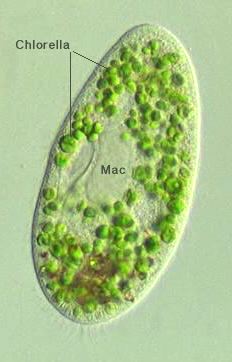It's the first Science Byte of the month - so let's talk about the MSOE August challenge! This month, endosymbionts was chosen. Here are some point form fact on what the heck that is:
- Endosymbionts are organisms that live in an endosymbiosis. Word origins are my favourite way to define a word, so here we go (all from the Greek): endo = within; syn = together; biosis = living. So endosymbionts are organisms that live inside another organism, creating a mutually beneficial relationship (well, usually - sometimes the endosymbiont is destructive to its host).

- Some examples? The bacteria that live in your gut (and those of many animals & insects), helping you digest your food. There are some bacteria that perform a similar function for plants too, living inside nodules in the roots.
- So what? Well, this relationship has helped develop a theory on the evolution of cells. Called the Endosymbiotic Theory, it states that chloroplasts & mitochondria derived from intra-cellular endosymbionts.
 OK, now let me explain that in terms everyone who isn't a biologist will understand. Small, single-celled organisms, like bacteria (PROkaryotes), are different from the cells inside multi-cellular organisms like us, animals, plants & insects (EUkaryotes). One of the major differences is that our cells have membrane-bound intracellular organelles. HUH? Let's back up a bit. So all cells have a membrane around them, holding all the stuff inside. Inside eukaryotic cells though, there are smaller compartments (organelles) that are also bound by a membrane (one that is separate from the cell membrane) - you won't find any of these inside a prokaryotic cell. But if you look closely at these organelles, some of them (specifically mitochondria in animals & chloroplasts in plants) look a lot like a little prokaryote: it has it's own DNA, proteins & function. Interestingly, mitochondria & chloroplasts provide energy for eukaryotic cells, just as endosymbionts do for their host!
OK, now let me explain that in terms everyone who isn't a biologist will understand. Small, single-celled organisms, like bacteria (PROkaryotes), are different from the cells inside multi-cellular organisms like us, animals, plants & insects (EUkaryotes). One of the major differences is that our cells have membrane-bound intracellular organelles. HUH? Let's back up a bit. So all cells have a membrane around them, holding all the stuff inside. Inside eukaryotic cells though, there are smaller compartments (organelles) that are also bound by a membrane (one that is separate from the cell membrane) - you won't find any of these inside a prokaryotic cell. But if you look closely at these organelles, some of them (specifically mitochondria in animals & chloroplasts in plants) look a lot like a little prokaryote: it has it's own DNA, proteins & function. Interestingly, mitochondria & chloroplasts provide energy for eukaryotic cells, just as endosymbionts do for their host!
Wow. That was a paragraph & a half! I hope it's clear enough... obviously there's a bit more to it than that, but I think I'll stop now. Feel free to ask me questions in the comments!

1 comment:
Mitochondria have always been my favorite organelle - they quite the "powerhouse!" :P
Post a Comment